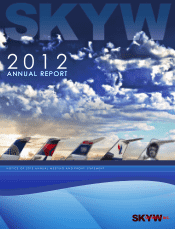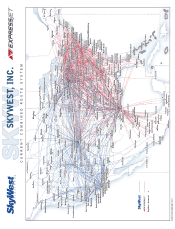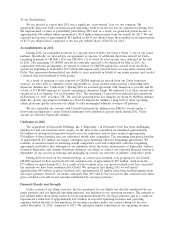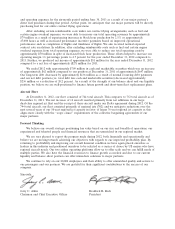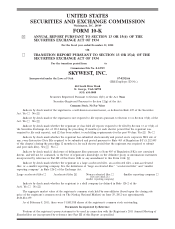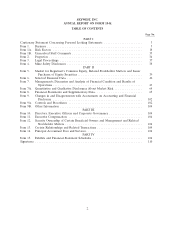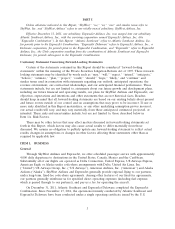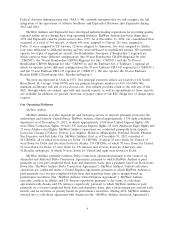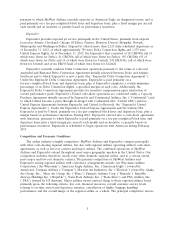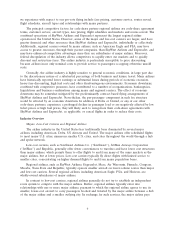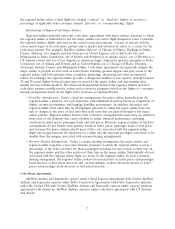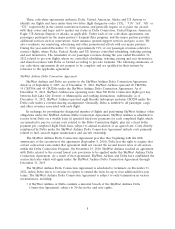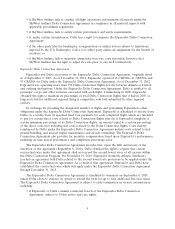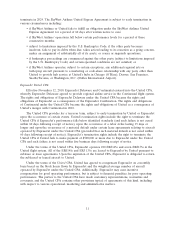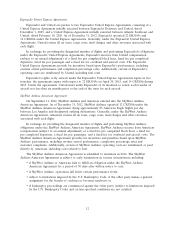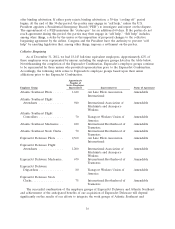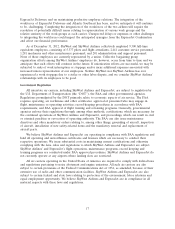SkyWest Airlines 2012 Annual Report Download - page 11
Download and view the complete annual report
Please find page 11 of the 2012 SkyWest Airlines annual report below. You can navigate through the pages in the report by either clicking on the pages listed below, or by using the keyword search tool below to find specific information within the annual report.the regional airline either a fixed flight fee, termed ‘‘contract’’ or ‘‘fixed-fee’’ flights, or receives a
percentage of applicable ticket revenues, termed ‘‘pro-rate’’ or ‘‘revenue-sharing’’ flights.
Relationship of Regional and Major Airlines
Regional airlines generally enter into code-share agreements with major airlines, pursuant to which
the regional airline is authorized to use the major airline’s two-letter flight designator codes to identify
the regional airline’s flights and fares in the central reservation systems, to paint its aircraft with the
colors and/or logos of its code-share partner and to market and advertise its status as a carrier for the
code-share partner. For example, SkyWest Airlines flies out of Chicago (O’Hare), Washington Dulles,
Denver, Houston, Los Angeles and San Francisco as United Express, out of Salt Lake City and
Minneapolis as Delta Connection, out of Seattle and Portland as an Alaska carrier, out of Phoenix as a
US Airways carrier and out of Los Angeles as American Eagle. ExpressJet operates primarily as Delta
Connection out of Atlanta and Detroit and as United Express out of Chicago (O’Hare), Houston,
Cleveland, Newark, Denver and Washington Dulles. Code-share agreements also generally obligate the
major airline to provide services such as reservations, ticketing, ground support and gate access to the
regional airline, and both partners often coordinate marketing, advertising and other promotional
efforts. In exchange, the regional airline provides a designated number of low-capacity (usually between
30 and 70 seats) flights between larger airports served by the major airline and surrounding cities,
usually in lower-volume markets. The financial arrangements between the regional airlines and their
code-share partners usually involve contractual or fixed-fee payments based on the flights or a revenue-
sharing arrangement based on the flight ticket revenues, as explained below:
•Fixed-Fee Arrangements. Under a fixed-fee arrangement, the major airline generally pays the
regional airline a fixed-fee for each departure, with additional incentives based on completion of
flights, on-time performance and baggage handling performance. In addition, the major and
regional airline often enter into an arrangement pursuant to which the major airline bears the
risk of changes in the price of fuel and other such costs that are passed through to the major
airline partner. Regional airlines benefit from a fixed-fee arrangement because they are sheltered
from most of the elements that cause volatility in airline financial performance, including
variations in ticket prices, passenger loads and fuel prices. However, regional airlines in fixed-fee
arrangements do not benefit from positive trends in ticket prices, passenger loads or fuel prices
and, because the major airlines absorb most of the costs associated with the regional airline
flight, the margin between the fixed-fees for a flight and the expected per-flight costs tends to be
smaller than the margins associated with revenue-sharing arrangements.
•Revenue-Sharing Arrangements. Under a revenue-sharing arrangement, the major airline and
regional airline negotiate a proration formula, pursuant to which the regional airline receives a
percentage of the ticket revenues for those passengers traveling for one portion of their trip on
the regional airline and the other portion of their trip on the major airline. Substantially all costs
associated with the regional airline flight are borne by the regional airline. In such a revenue-
sharing arrangement, the regional airline realizes increased profits as ticket prices and passenger
loads increase or fuel prices decrease and, correspondingly, realizes decreased profits as ticket
prices and passenger loads decrease or fuel prices increase.
Code-Share Agreements
SkyWest Airlines and ExpressJet operate under United Express Agreements with United. SkyWest
Airlines and ExpressJet operate under Delta Connection Agreements with Delta. ExpressJet operates
under the United CPA with United. SkyWest Airlines and ExpressJet operate under capacity purchase
agreements with American. SkyWest Airlines operates under code-share agreements with US Airways
and Alaska.
7

